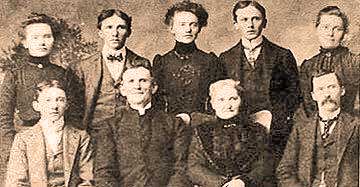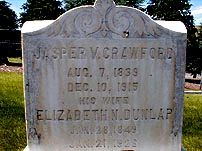Main Pioneer Menu | Profiles Index | Search Engine
Jasper Vincent Crawford
Pioneer Preacher in Oregon and Washington
By Charles Dailey - 2000
Jasper Vincent Crawford at a Glance: Born: 1839 in Jefferson Co. Indiana Oregon: Overland in 1851 Married: Elizabeth Dunlap in 1876 Family: See list at bottom. Preached:
1893 -- Waitsburg, WA
1898 -- Enterprise, OR
1902 -- Heppner, OR
Died: 1915 at Heppner in
Morrow County, OregonBuried: Heppner Masonic Cemetery
Jasper V. Crawford had family ties that led back to the roots of the Stone/Campbell Movement. His parents, Philemon Vawter Crawford and Letitia Smith Crawford had brought their family, including 12 year old Jasper, overland in 1851. They entered the Willamette Valley by the Barlow Road.P.V. Crawford had been influenced by the preaching of Barton W. Stone before traveling west. Several family members had accepted Stone's view that we could be Christians without being part of any denomination or approving any creed.

J. V. Crawford Before leaving his greater family, J. V. was postmaster at Crawfordsville in Linn County, Oregon. He sister Louisa Lewis wrote "that the postoffice was kept in Mr. Heisler's store at the intersection of the Calapooia and the Brush Creek roads, and that was called the McCaw Lane, as the first place after crossing Brush Creek was Mr. McCaw's place."
The young postmaster met red-headed Elizabeth Dunlap of Brownsville when she came to Crawfordsville to attend a meeting. They married in 1876. Jasper's sister, Mary Ann, also married Elizabeth's brother, David Dunlap.
Elizabeth's father, John, was a representative to the Oregon Territorial Legislature and had been elected as Linn County Commisioner in 1849.

J. V. Crawford Family in 1901
Front row: probably Otheo, Jasper, Elizabeth, and Vawter.
Back: Gertrude, Neal, Maude, Garfield and Letitia.The Crawford family moved to Waitsburg, Washington Territory, in 1880. J. V. is listed as a delegate to a church meeting in Dayton in 1882 and as an elder in 1883, fully 10 years before he is listed as the minister. During that decade, he earned the family living in a painting and carpentering business.
By 1898, J. V. Crawford had left Waitsburg for Enterprise in Oregon State. A congregation was in its infancy and getting ready to build. Mr. Crawford used his skills in construction to assist with the new building.
The family may have been attracted to Heppner, Oregon because their oldest son, Vawter, had moved there in 1889. He was involved in publishing, government service and banking. His children were also the grandchildren of Jasper and Elizabeth. In 1902 J. V. Crawford was selected as minister of the Heppner Christian Church.
One of Jasper's strengths was his music. He was noted for his singing and used this skill in night-to-night revival meetings in Eastern Oregon and Washington.
Historian Clarence Swander knew J. V. Crawford. He says,
1851 also brought an interesting and lovable character in the person of J. V. Crawford. He was a lad of 12 years when be arrived in Yamhill county from St. Joseph, Missouri, via ox team. It took five months to make the journey. . . .At another point, Mr. Swander give us insight to his friend.In due time Brother Crawford became a preacher of the Word. His footprints are still seen, especially east of the mountains where he served most of his ministry. He is another one of the pioneers whom it was the privilege of the author to know personally; and out of that acquaintance has grown the conviction that if there are any seats in heaven higher and easier than others, Brother Crawford will be occupying one of them.
One of the best statements of the financial situation of that early day comes from the pen of J. V. Crawford, a pioneer of 1851, a preacher who knew from experience whereof he spoke, and who will always live in the memory of the author as one of God's chosen men. He says:It is correctly surmised that the writer of this excerpt was not affected by the “parsimony” mentioned in the letter. Brother Crawford was an extremely broadminded man, charitable to champion and antagonist alike, and supported the church “as much as in him” was in an unusually liberal manner.“The minister preached for no stipulated salary, and the voluntary contributions were very small, as no public collections were taken. Preachers supported themselves and their families by other labor, usually on the farm, while they preached the gospel ‘free gratis for nothing.’ To that custom we are indebted, in no small degree, for the niggardly parsimony now rife in many of our churches. They were true to the Book, however, and hewed to the line, letting the chips fall where they would. They never failed to declare the whole counsel of God as they understood it and woe to the witless ‘sectarian’ wight who unsheathed his sword in an attack on their position.”Mr. Crawford spent his final years in Heppner, Oregon. He was minister of the Christian Church for a few years, and then retired there for the rest of his life. J. V. and Elizabeth share the same beautiful headstone in the Heppner Masonic Cemetery.

JASPER V. CRAWFORD
AUG. 7, 1839
DEC. 10, 1915
HIS WIFE
ELIZABETH N. DUNLAP
JAN. 28, 1849
JAN. 21, 1926
Elizabeth's parents, John and Jane Dunlap, moved to Waitsburg when Jasper's family lived there. Several members of her family had migrated to Waitsburg. The Senior Dunlaps were living with their son, John Knox Dunlap, at the time of their deaths in 1894.
They are buried in the Odd Fellows Cemetery. Oddly, they are misnamed in the cemetery records as John A. Crawford and Jane C. Crawford instead of Dunlap. One researcher speculated the error was because Jasper and Elizabeth Crawford had purchased the plot. The graves are not marked.
Jasper Vincent Crawford (1839-1915) & Elizabeth Dunlap | Janet Maude Crawford (1895-) & C. A. Jones | William Vawter Crawford | | Arthur Crawford | | Spencer Crawford | Letitia Crawford & L. G. Atherton | Gertrude Crawford & F. S. Parker | Jasper Garfield Crawford & Kitty Olive Barry | Neal Crawford | Otheo Crawford
Main Pioneer Menu | Profiles Index | Search Engine